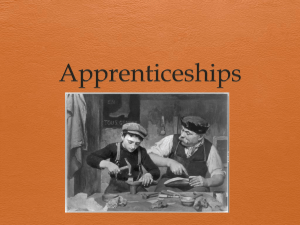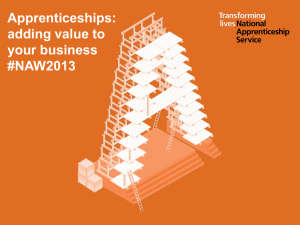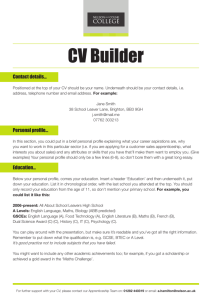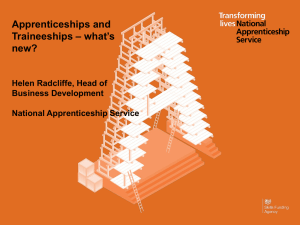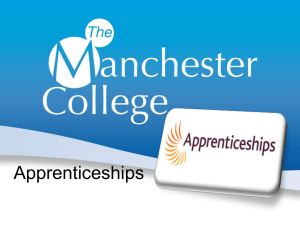Workforce Learning Summit Innovation or Best Practice
advertisement
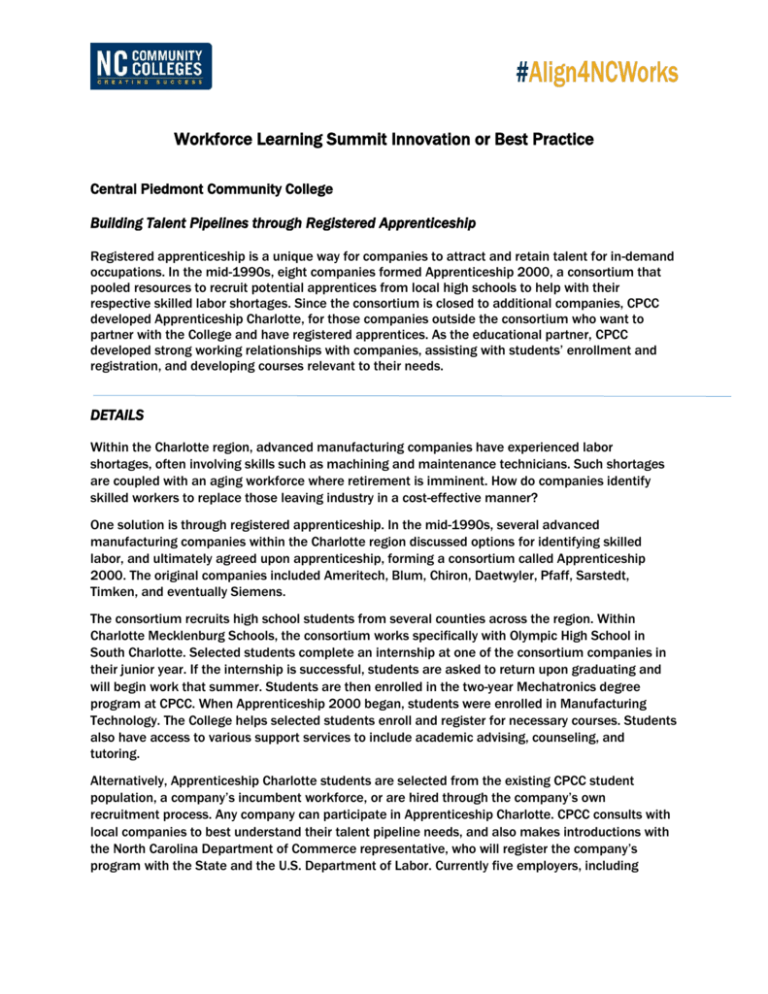
Workforce Learning Summit Innovation or Best Practice Central Piedmont Community College Building Talent Pipelines through Registered Apprenticeship Registered apprenticeship is a unique way for companies to attract and retain talent for in-demand occupations. In the mid-1990s, eight companies formed Apprenticeship 2000, a consortium that pooled resources to recruit potential apprentices from local high schools to help with their respective skilled labor shortages. Since the consortium is closed to additional companies, CPCC developed Apprenticeship Charlotte, for those companies outside the consortium who want to partner with the College and have registered apprentices. As the educational partner, CPCC developed strong working relationships with companies, assisting with students’ enrollment and registration, and developing courses relevant to their needs. DETAILS Within the Charlotte region, advanced manufacturing companies have experienced labor shortages, often involving skills such as machining and maintenance technicians. Such shortages are coupled with an aging workforce where retirement is imminent. How do companies identify skilled workers to replace those leaving industry in a cost-effective manner? One solution is through registered apprenticeship. In the mid-1990s, several advanced manufacturing companies within the Charlotte region discussed options for identifying skilled labor, and ultimately agreed upon apprenticeship, forming a consortium called Apprenticeship 2000. The original companies included Ameritech, Blum, Chiron, Daetwyler, Pfaff, Sarstedt, Timken, and eventually Siemens. The consortium recruits high school students from several counties across the region. Within Charlotte Mecklenburg Schools, the consortium works specifically with Olympic High School in South Charlotte. Selected students complete an internship at one of the consortium companies in their junior year. If the internship is successful, students are asked to return upon graduating and will begin work that summer. Students are then enrolled in the two-year Mechatronics degree program at CPCC. When Apprenticeship 2000 began, students were enrolled in Manufacturing Technology. The College helps selected students enroll and register for necessary courses. Students also have access to various support services to include academic advising, counseling, and tutoring. Alternatively, Apprenticeship Charlotte students are selected from the existing CPCC student population, a company’s incumbent workforce, or are hired through the company’s own recruitment process. Any company can participate in Apprenticeship Charlotte. CPCC consults with local companies to best understand their talent pipeline needs, and also makes introductions with the North Carolina Department of Commerce representative, who will register the company’s program with the State and the U.S. Department of Labor. Currently five employers, including Bosch-Rexroth, HAWE Hydraulics, Daimler, Muratec, and Siemens, are a part of Apprenticeship Charlotte, with 14 student participating. In terms of strategy, CPCC tries to best meet the educational needs of companies within both Apprenticeship 2000 and Apprenticeship Charlotte. This includes flexible scheduling of classes, allowing students to enroll within the first week of the term, or adding additional course sections. Apprenticeship Charlotte also has spent time conducting employer outreach regarding registered apprenticeship, since many U.S. companies are unfamiliar with the concept. Initial outreach has begun with advanced manufacturing companies, and the focus has primarily been on identifying Mechatronics Technology or other Engineering students. Apprenticeship 2000 began in 1995; Apprenticeship Charlotte launched in Fall 2012. Partner Type(s): Business/Industry (direct involvement) Public Schools Other: NC Department of Commerce – Division of Workforce Solutions (registration/oversight of apprenticeships) Impact/Outcomes 128 apprentices have graduated from the Apprenticeship 2000 program in either Manufacturing Technology or Mechatronics Technology (two-year degree program) since inception. Overall, apprenticeships have helped the companies within the Apprenticeship 2000 consortium to find skilled labor when supply has been limited. Retention has been strong among the participants. Students going through the program received full-time pay, even while they were in school, and paid tuition. Apprenticeship Charlotte has not had graduates yet, since the program is relatively new. However, the participating companies and students also have the same benefits. Funding Source(s) N/A REFLECTIONS Innovation or Best Practice The mindset at CPCC has been to offer classes based on a certain schedule that we have developed. With the apprenticeships, the College became mindful of when classes needed to be offered to meet employer needs. Therefore, the employer had greater input with regard to the schedule. The program area content also had to be reflective of what the students needed to learn on the job. Classes sometimes had to change; alternatively, some courses had to be removed and other courses added. Ultimately, CPCC became more flexible in order to meet the employers’ talent pipeline needs. Lessons Learned Working with either students or employers requires clearly defined processes and procedures, plus a marketing plan to communicate the definition of apprenticeship, especially for U.S. companies. Scalability The Apprenticeship 2000 consortium is closed to new companies, so it is unable to grow in that regard. However, Apprenticeship Charlotte is open to any company in the Charlotte area. The program is a flexible apprenticeship model, in the sense that companies could have apprentices in two-year degree programs, diplomas, and certificates. RESOURCES Workforce Learning Summit Presenters Chris Paynter, Dean of STEM, Central Piedmont Community College Jill Lutz, Interim Associate Dean-Workplace Learning, Central Piedmont Community College Mike Realon, Career Development Coordinator, Olympic High School Dawn Braswell, Training Coordinator, Siemens Wendy Whitaker, Human Resources Assistant, HAWE Hydraulics Joanna Gentry, Apprentice, HAWE Hydraulics Daniel Gonzales, Apprentice. HAWE Hydraulics Links http://apprenticeship2000.com/index.html http://www.cpcc.edu/workplacelearning For Further Information Mary Vickers-Koch Dean of Harris Campus/Business and Industry Learning Central Piedmont Community College Email: mary.vickers-koch@cpcc.edu Phone: 704.330.4656

